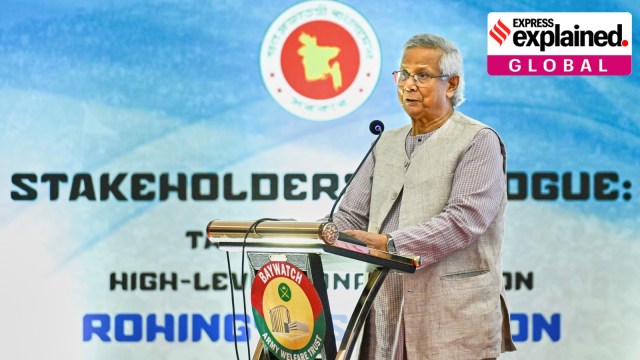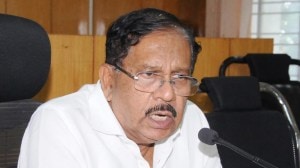Why Yunus’ call for ‘safe return’ of Rohingya to Myanmar is unrealistic
The more than 1.1 million Rohingya refugees in Bangladesh put a massive strain in the developing country’s resources. But sending them back to Myanmar will not be easy
 Chief Adviser Professor Muhammad Yunus speaks at a stakeholders' dialogue on the Rohingya situation in Cox's Bazar, Bangladesh, on Monday (AP Photo/Mahmud Hossain Opu)
Chief Adviser Professor Muhammad Yunus speaks at a stakeholders' dialogue on the Rohingya situation in Cox's Bazar, Bangladesh, on Monday (AP Photo/Mahmud Hossain Opu)Muhammad Yunus, the interim leader of Bangladesh, on Monday (August 25) said that his country can no longer provide additional support to the more than 1.1 million Rohingya refugees living within its borders, and called on the international community to work on a roadmap for their “safe return” to Myanmar.
“Their right to return to their own home and homeland has to be secured,” Yunus said in his speech at a two-day international conference on the Rohingya in Cox’s Bazar. The Nobel-winning economist-turned-politician also urged donors to reverse declining funding that is crucial to sustaining the Rohingya population in Bangladesh’s refugee camps.
Nearly 800,000 Rohingya fled to Bangladesh from Myanmar’s Rakhine State in August 2017 following a brutal military crackdown that the United Nations has described as “genocide”. Thousands have entered Bangladesh since then. Sending them safely back to Myanmar will not be easy.
Rohingya in Bangladesh
The Rohingya are a predominantly Muslim ethnic group from the Rakhine State in Myanmar’s southwestern corner. They have suffered systematic discrimination, disenfranchisement, and targeted persecution for decades.
Even before 2017, small and large groups have been coming to Bangladesh to flee ethnic violence in Rakhine: waves of Rohingya arrived in 1978, 1992, 2012, and 2016. The exodus of 2017 was triggered by a military campaign targeting the community, which resultded in mass torture, gangrape, executions, and the razing of hundreds of Rohingya villages.
 Joint Government of Bangladesh-UNHCR Population map (as of July 2025). UNHCR
Joint Government of Bangladesh-UNHCR Population map (as of July 2025). UNHCR
According to the latest figures from the United Nations High Commissioner for Refugees (UNHCR), there are currently 1,148,529 Rohingya refugees in Bangladesh, a vast majority of whom (1,111,490) live in 33 congested refugee camps in Cox’s Bazar.
This is due to the region’s proximity to the Rakhine state: refugees either cross the Naf river and make the journey to the camps over land or arrive at Cox’s Bazar’s sandy white beaches on rickety boats after journeying along the coast.
Change in Dhaka’s attitude
In August 2017, then Prime Minister Sheikh Hasina opened her country’s doors to the persecuted minority, saying that they reminded her of the plight of her own family and people during the 1971 war of liberation. At the time, India had opened its doors to Bangladeshi refugees.
But unlike Bangladeshis, the Rohingya never got a state of their own — and it is difficult to imagine a future in which they do get one. This has meant that most refugees who fled to Bangladesh in 2017 remain in the country. And thousands more have been born in the refugee camps, where the absence of persecution and assurance of food and medical care have created ideal circumstances for a population explosion.
“The annual rate of growth of population in Bangladesh is 1%, while the population of the Rohingya is growing at 6 or 7%…more than 200,000 children have been born in the camps here,” Dr Hasan Mahmud, then the Information and Broadcasting Minister of Bangladesh, said in 2022.
Over time, Bangladesh has started tiring under the burden of its own generosity. “The impact on our economy, resources, environment, ecosystem, society, and governance has been huge” Yunus said on Monday.
Challenge of repatriation
The Rohingya themselves want to go home. Thousands took to the streets around Cox’s Bazar’s camps on Monday demanding justice for the atrocities committed in 2017 and calling for repatriation to their homeland.
“People here we’ve been talking to…they’re calling for two things. One is for justice for the genocide in 2017, eight years ago to this day. Secondly, about repatriating them. They absolutely want to go home. This is at the top of everyone’s list of demands here,” Al Jazeera reporter Tony Cheng said.
But repatriation is easier said than done amid a brutal civil war which has been raging in Myanmar since 2021. The Rakhine state has witnessed some of the worst fighting, with the ethnic Arakan Army jostling for control over the territory against the Burman-dominated military.
Both the military and local ethnic fighters from the Arakan Army “have committed and continue to commit serious atrocity crimes against the Rohingya with impunity… in flagrant violation of international law,” UN human rights office spokesman Jeremy Laurence said last week.
And as the world remains busy with the happenings in Gaza and Ukraine, there has simply not been enough political will to intervene in Myanmar for the Rohingya. The conference in Cox’s Bazar conference came ahead of a UN conference in New York on September 30, but prospects for a safe and swift return remain slim.
Catch-22 situation
It is not that the situation in the camps is very good.
Faced with a rising population of refugees on its soil, the Bangladeshi administration has tried to keep the Rohingya restricted to the camps, denying them livelihood and other opportunities. There is zero political appetite to even consider assimilating the Rohingya into Bangladesh’s own citizenry.
Amidst all this, there has been a global slowdown in funding, especially since US President Donald Trump gutted USAID, one of the biggest funders for the upkeep of the Rohingya in Bangladesh. Food shortage is said to be rampant inside the refugee camps.
Fatema Khatoon, who has had to flee Myanmar thrice — in 1978, 1992 and again in 2018 — told Al Jazeera: “I want to go home with justice, to get back my land and property. I want to see peace there. It’s been eight years since I came here for the third time. How much longer must we suffer?”
- 01
- 02
- 03
- 04
- 05






































